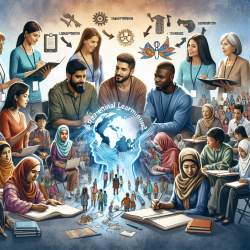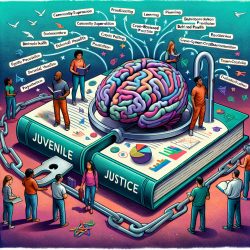Introduction
In an ever-globalizing world, the demand for social workers who are culturally sensitive and well-versed in international practices is more pressing than ever. The research article "Theory is Not Enough! Experiential and Project-Based Approaches to Teaching International Social Work" highlights the transformative power of experiential and project-based learning in preparing social work students for the complexities of global practice. This blog post delves into how these educational approaches can enhance practitioner skills, fostering better outcomes for communities in need.
The Power of Experiential Learning
Experiential learning immerses students in real-world environments, allowing them to apply theoretical knowledge to practical situations. This approach is particularly effective in international social work, where understanding cultural nuances and global systems of oppression is crucial. The study found that students who participated in experiential learning programs reported significant personal and professional growth, gaining insights that are difficult to achieve through traditional classroom settings alone.
Project-Based Learning: A Collaborative Approach
Project-based learning involves students working on real-world projects in collaboration with external stakeholders. This method not only enhances student learning but also provides tangible benefits to partner agencies. By engaging in project-based learning, students develop a deeper understanding of the complexities of humanitarian response, learning to navigate challenges and implement effective solutions in diverse cultural contexts.
Implementing Experiential and Project-Based Learning
For practitioners looking to improve their skills, incorporating experiential and project-based learning into their educational journey can be transformative. Here are some steps to consider:
- Seek Opportunities for Immersion: Engage in programs that offer fieldwork or study abroad experiences to gain firsthand insights into global social work practices.
- Collaborate with Diverse Stakeholders: Partner with international agencies and local communities to work on projects that address real-world challenges.
- Reflect on Experiences: Regularly reflect on your experiences to identify areas for growth and apply lessons learned to future practice.
Encouraging Further Research
While experiential and project-based learning offer significant benefits, further research is needed to measure their impact on student outcomes and agency collaborations. Practitioners are encouraged to explore these educational models and contribute to the growing body of research in this area.
Conclusion
Experiential and project-based learning represent powerful tools for preparing social work practitioners to meet the demands of an interconnected world. By embracing these approaches, educators and practitioners can foster a new generation of social workers equipped with the skills and knowledge needed to drive positive change on a global scale.
To read the original research paper, please follow this link: Theory is Not Enough! Experiential and Project-Based Approaches to Teaching International Social Work.










